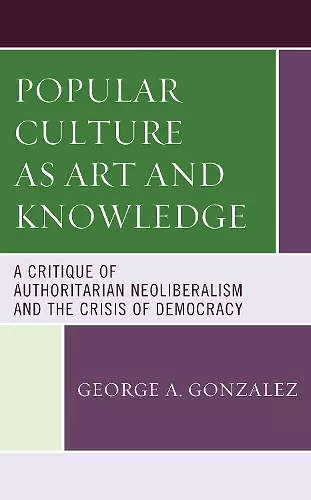Popular Culture as Art and Knowledge
A Critique of Authoritarian Neoliberalism and the Crisis of Democracy
Format:Hardback
Publisher:Lexington Books
Published:15th Jan '19
Currently unavailable, and unfortunately no date known when it will be back

This volume settles the debate between analytic and continental philosophy. It turns to art, more specifically popular culture, to demonstrate the validity of continental philosophy. Drawing on the philosophy of Georg Hegel (perhaps the most important of continental philosophers), James Kreines holds that reason in the world metaphysically exists. Reasons of the world are reasons of the Hegelian Absolute. Thus, similar to the fact that gravity is curves in the space-time continuum along which matter moves – reasons are the grooves in the Absolute along which human decision-making occurs. Art allows us to conceptualize, understand, speculate about the grooves (reasons) of the Absolute. Two key points can be drawn from Kreines’s position: first, normative values are embedded in reality. Thus, in complete contradistinction to analytic philosophy, there is no bifurcation between the empirical and the normative – to exist is to have normative value. Secondly, the role of social science is to cogitate, explore, identify the reasons of the world that shape social, political norms. Such an approach would decisively move the social sciences away from an emphasis on statistically significant patterns of human behavior (e.g., voting studies) and toward an approach that seeks to analyze the reasons of the world that motivate/shape social and political decisions. Art (particularly popular culture) becomes an important source in identifying the way that people reason about the world and how they perceive political elites reasoning in the world. To adjudicate between continental and analytic philosophy this book on relies on the broadcast iterations of Star Trek, as well as Nazi cinema. With regard to contemporary American politics, in addition to Star Trek, it draws on the television series Game of Thrones, Veep, House of Cards, and The Man in the High Castle. Popular culture is germane to philosophy and contemporary politics because television/movie creators frequently try to attract viewers by conveying authentic philosophical and political motifs. Conversely, viewers seek out authentic movies and television shows. This is in contrast to opinion surveys (for instance), as the formation of the data begins with the surveyor seeking to directly solicit an opinion – however impromptu or shallow.
I enjoyed reading this engaging and thoughtful work, indeed an entertaining work in an intellectual sense. It draws on popular entertainments, films especially, that shed light on the values and disvalues that pass by us, even while deeply influencing us, in everyday life. Art, and popular art not least, can offer us sources of knowledge of normative values. The book is philosophically informed and helpfully concerned with the contrast of Continental and analytic philosophy, while being refreshingly open to Hegelian possibilities of thought. -- William Desmond, David Cook Chair in Philosophy, Villanova University; Thomas A.F. Kelly Visiting Chair in Philosophy, Maynooth University, Ireland; and professor of philosophy emeritus, Institute of Philosophy, KU Leuven, Belgium
Starting from a metaphysical interpretation of Hegel, but substituting a spritely clarity for Hegel’s impenetrable prose, Gonzalez shows that art, especially popular art, is an expression of ultimate reality. In detailed discussions of some of the most important products of contemporary popular art, Gonzalez investigates how shows such as Game of Thrones, House of Cards, The Man in the High Castle, and other shows convey important truths about our lives and the universe in which we live them. This book teaches important lessons in a highly entertaining way. -- John McCumber, University of California, Los Angeles
ISBN: 9781498589772
Dimensions: 232mm x 159mm x 16mm
Weight: 336g
130 pages